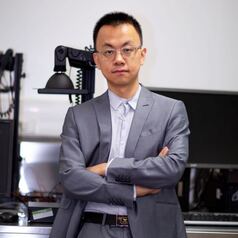
Tianyi Ma
Distinguished Professor in Chemistry and Renewable Energy, RMIT University
Tianyi Ma has multi-national, multi-university experience at several of the world’s top universities. He obtained his PhD from Nankai University, one of the top universities in China. Then, he worked at the University of Adelaide, University of Newcastle, and Swinburne University of Technology across different states of Australia. He is now a Full Professor in the School of Science at RMIT University. He was awarded an Australian Research Council (ARC) Discovery Early Career Researcher Award (DECRA) in 2014 and an ARC Future Fellow in 2021, both of which are highly competitive fellowship schemes - thereby indicating his outstanding academic achievement. He was made a Fellow of the Royal Society of Chemistry (FRSC) in 2021, which is a prestigious honour to those who must have made an outstanding contribution to the advancement of chemical sciences.
He is a world-leading scientist in the renewable energy field, with pioneering work conducted in areas of functional photocatalytic, electrocatalytic, thermocatalytic and piezocatalytic materials for renewable solar, mechanical and thermal energy harvesting and utilisation, as well as carbon capture, utilisation and storage (CCUS). These processes have been further incorporated into his developed next-generation high-performance battery and supercapacitor-based energy storage devices. He has published over 350 peer-reviewed journal papers (252 as the first or corresponding author, 229 with a journal impact factor > 10, 64 with a journal impact factor > 20, 8 with a journal impact factor > 30, and > 35 invited reviews) in top-tier journals such as Nature Communications, Angewandte Chemie International Edition, Journal of the American Chemical Society, and Advanced Materials. In total, his papers have attracted over 35,000 citations with an H-index of 89. The substantial impact is also evidenced by 60 of his papers being ranked as ESI Top 1% or 0.1% Highly Cited Papers, resulting in him being ranked as the Clarivate’s ESI Highly Cited Researcher in 2020 - 2023 (both Materials Science and Chemistry fields), standing among Top 1% of the global researchers.
He is not only a champion researcher, but also an exceptional research leader. He has supervised more than 30 PhD students, many of whom have received research awards and scholarships at multiple levels. He is actively engaged in organising international and domestic conferences, and has given more than 30 plenary, keynote and invited talks. His professional leadership is also evidenced by heavy engagement in academic roles including serving as the Associate Editor or Editorial Board Member for many journals such as Materials Reports: Energy, Rare Metals, and Journal of Electronic Materials; 10 themed issues were published by him as the leading guest editor.
As chief investigator, he has secured over $21m funding from the Federal Government, the Victorian State Government, and industry partners to conduct innovation work, which is not only fundamentally significant but also shows far-reaching impact for industry. Via ARC Linkage, CSIRO Collaboration, AusIndustry R&D Finding, CRC-P, ARNEA and CCUS-Technology Projects, he has established substantial collaborations with industry partners including Siemens Australia, Loy Yang Electricity, Advanced Carbon Energy, GrapheneX, and EntX. The lab-scale renewable energy devices and systems based on his game-changing functional materials and technologies have since been up-scaled to prototype demonstrations and pilot plants. He plays a key role as the group leader, chief investigator and critical initiator in securing these industry-directed funds.
He is now leading the Carbon Neutrality Group at RMIT, all while collaborating with researchers from the USA, UK, China, Japan, Korea, Canada, India, Saudi Arabia and other regions. He aims to combine aforementioned revolutionary technologies focusing on all sectors of the renewable energy supply chain to eventually achieve global carbon neutrality.

Yes, carbon capture and storage is controversial – but it’s going to be crucial
Jun 06, 2024 11:29 am UTC| Economy
Renewable energy sources such as wind and solar are vital tools to help us make cuts to the 36 billion tonnes of greenhouse gases we emit each year. But renewables alone cant get us to net zero. Sectors such as cement,...
- Market Data









































